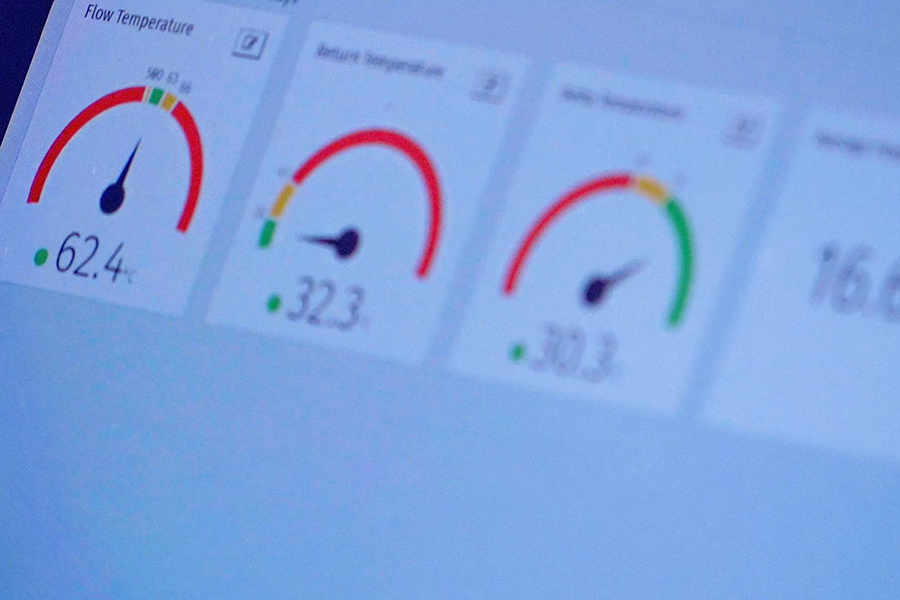Wholesale gas prices have risen sharply this winter and the impact on energy bills has been considerable. The price cap which protects customers who heat their homes using gas boilers had already risen by 12% in October, and will rise again by an unprecedented 54% from April.
Despite the rise, the impact for customers living on heat networks could be even greater. This is because customers living on district or communal schemes are not protected by the price cap.
As homes on heat networks are all supplied by a single energy supplier, this is classified as a commercial rather than domestic supply. If suppliers choose to pass on wholesale costs (when they can do) then prices can rise unchecked.
The UK Government is considering how best to help customers living on heat networks, but their options are limited compared to what they can do to support customers in the regulated sector i.e. for those who heat their homes using gas boilers.
How heat suppliers can act now to help reduce customer bills
Heat network performance has the biggest influence on resident heating bills.
Even if a price cap applied to heat networks, customers living on inefficient networks would be unlikely to see a significant benefit. This is because the inefficiency on a heat network acts as a multiplier of the underlying gas cost.
In short, inefficient networks use more gas to deliver the same amount of useful heat to customers, and so cost more to run – and those costs are usually passed on to residents.
For example:
- On a well performing heat network, if 20% of the heat supplied to a heat network is lost from the network as heat losses, then 80% of the heat energy leaving the plant room is ‘useful’. The cost per unit of heat at the point of generation is divided by 0.8 (or multiplied by 1.25) to arrive at the cost per unit of heat consumed by customers on the network.
- On a poorly performing network, if 70% of the heat supplied to a heat network is lost from the network as heat losses, then 30% of the heat energy leaving the plant room is ‘useful’. The cost per unit of heat at the point of generation is divided by 0.3 (or multiplied by 3.33) to arrive at the cost per unit of heat consumed by customers on the network.
Typical heat usage in the UK is around 12,000 kWh of gas. Wholesale prices peaked at 9.21p per kWh (converted from therms) on December 20, 2021 but remain high. Using the figure of 9.21p, you can see the impact of inefficient networks on bills.
9.21p per kWh * 12,000 kWh = £1,105 to heat a typical UK home, per year.
£1,105 / 0.8 = £1,381 to heat a home on a heat network with 20% losses.
£1,105 / 0.3 = £3,683 to heat a home on a heat network with 70% losses.
Even if a price cap could be put in place for heat network customers, it would only apply to input fuel, not to ‘useful heat’ experienced by a customer. Therefore, the performance of the network is the biggest influence on a customer’s bill.
This is how quickly the multiplier can escalate:
| Losses as a percentage of input energy | Heat cost multiplier |
| 20% | 1 / 0.8 = 1.25 |
| 30% | 1 / 0.7 = 1.43 |
| 40% | 1 / 0.6 = 1.67 |
| 50% | 1 / 0.5 = 2.00 |
| 60% | 1 / 0.4 = 2.50 |
| 70% | 1 / 0.3 = 3.33 |
While many heat networks do run well, especially those that are monitored using performance data, many do not perform anywhere near their intended efficiency. Work carried out by Guru Systems for BEIS found that on average many only deliver 36% of input energy to dwellings as useful heat, against design efficiencies of more than 80%.
If customers are to be protected from rising wholesale prices, networks need to run as efficiently as possible.
Spot inefficiencies using Guru Pinpoint
With the right data, it’s easy to spot problems or inefficiencies on a heat network from the office. Our Guru Pinpoint software allows you to do exactly that.
Guru Pinpoint is an online analytics platform which gives developers, operators, and engineers access to the real-time performance data being collected by Guru Systems’ hardware installed across heat networks. The platform uses machine learning algorithms to help identify and resolve performance issues and improve the efficiency of the heat network.
The impact on heat losses and then customer bills is best demonstrated through a project run recently for the Department for Business, Energy & Industrial Strategy (BEIS).
Throughout 2020, heat networks consultancy FairHeat used Guru Pinpoint to analyse ten existing heat networks as part of a project for the Heat Network Optimisation Opportunities programme funded by BEIS.
FairHeat considered a variety of performance and reliability indicators before suggesting a series of costed improvement projects that would reduce heat losses (and therefore costs) across the network.
If the identified problems were then to be fixed, modelling work showed that heat losses would be reduced by an average of 40-50%.
These findings match a previous study conducted by Guru Systems and FairHeat which delivered improvements at Stockwell Park Estate in London reducing heat network losses by 53%.
The most common intervention works that were deemed both financially and technically viable included:
- Recommissioning Heat Interface Units (HIUs) and heating systems e.g. radiators within dwellings
- Closing network bypasses
- Reinsulating sections of the pipework within the dwelling and network
- Improving plant room controls including the pumps
- Hydraulic rearrangements
- Improving water quality
As well as heat loss reductions of 40-50%, proposed interventions had a modelled payback period of 0.4 and 7 years, with six of the schemes having a simple payback of less than 5 years.
FairHeat also noted that a heat loss reduction of over 30% was possible through optimisation alone, without the need for any major equipment replacement.
Lower heat losses make for lower customer bills
What’s clear to see, is that minor improvements to a heat network can make a huge impact on customer bills, and it’s something that heat suppliers can act on without waiting for government.
If you’re interested in learning more about how to improve heat network performance, please contact our Sales team via sales@gurusystems.com or 020 8050 4305.

